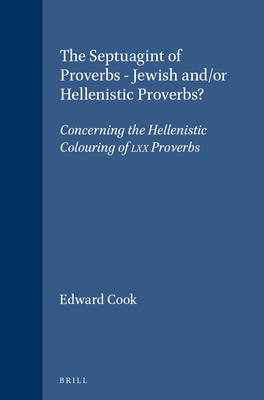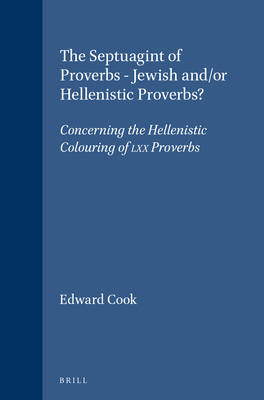
- Afhalen na 1 uur in een winkel met voorraad
- Gratis thuislevering in België vanaf € 30
- Ruim aanbod met 7 miljoen producten
- Afhalen na 1 uur in een winkel met voorraad
- Gratis thuislevering in België vanaf € 30
- Ruim aanbod met 7 miljoen producten
Zoeken
The Septuagint of Proverbs - Jewish And/Or Hellenistic Proverbs?
Concerning the Hellenistic Colouring of LXX Proverbs
Edward Cook
€ 460,95
+ 921 punten
Omschrijving
This monograph deals with an important but unexplored document of Hellenistic Judaism. The question of "Hellenistic influence" is addressed on the basis of an analysis of a representative number of chapters of Septuagint Proverbs (1, 2, 6, 8, 9, 24, 29, 30 and 31). Scholars have argued that this book was influenced extensively by Greek philosophy.
The author follows a contextual cultural method. The Greek text is analysed on four levels: the semantic, syntactical, stylistic (which represents the translation technique of the translator), and finally the "theological" level.
This study represents the first exhaustive analysis of the theme. The conclusion is that the impact of Stoicism on this Greek version has been overestimated in the past. Novel views are also formulated concerning the role of the law in LXX Proverbs, its historical setting and its text-critical value.
The author follows a contextual cultural method. The Greek text is analysed on four levels: the semantic, syntactical, stylistic (which represents the translation technique of the translator), and finally the "theological" level.
This study represents the first exhaustive analysis of the theme. The conclusion is that the impact of Stoicism on this Greek version has been overestimated in the past. Novel views are also formulated concerning the role of the law in LXX Proverbs, its historical setting and its text-critical value.
Specificaties
Betrokkenen
- Auteur(s):
- Uitgeverij:
Inhoud
- Aantal bladzijden:
- 416
- Taal:
- Engels
- Reeks:
- Reeksnummer:
- nr. 69
Eigenschappen
- Productcode (EAN):
- 9789004108790
- Verschijningsdatum:
- 2/11/1997
- Uitvoering:
- Hardcover
- Formaat:
- Genaaid
- Afmetingen:
- 167 mm x 245 mm
- Gewicht:
- 879 g

Alleen bij Standaard Boekhandel
+ 921 punten op je klantenkaart van Standaard Boekhandel
Beoordelingen
We publiceren alleen reviews die voldoen aan de voorwaarden voor reviews. Bekijk onze voorwaarden voor reviews.








